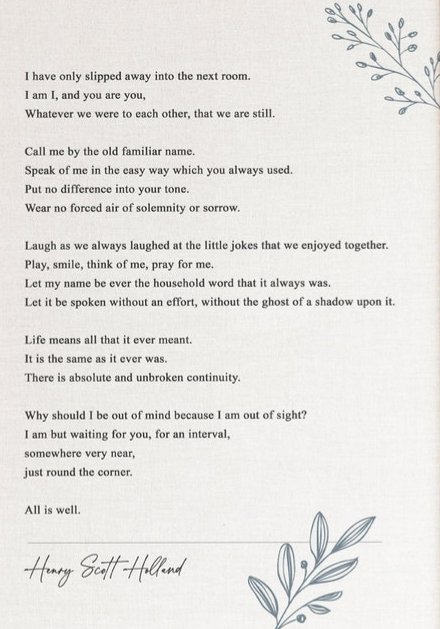
« June 2025 | Main | April 2025 »
This quiet breath, a fleeting spark,
Ignites a question in the dark.
What purpose guides this strange design,
This conscious flicker, truly mine?
No pre-spun tale, no whispered plea,
No illusion can hold me.
The path unwinds, each step unknown,
A silent seed that I have sown.
No grander script, no hidden play,
Just simply being, day by day.
No illusion can hold me.
A tremor stirs, a knowing deep,
Of endless voids where shadows sleep.
No grand design, no destined sweep,
Just this moment, mine to keep.
This stark reality sets me free:
No illusion can hold me.
The well-known poem "Death is nothing at all" comes from a speech given by Henry Scott Holland in May 1910, shortly after the passing of a national leader. Holland, a public speaker and thinker, delivered an address that aimed to reconcile the common human apprehension of demise with the idea of continued existence. The excerpt offers a profound message of reassurance, suggesting that a person's fundamental self and the connections they share persist beyond physical departure. This concept has made the lines a frequently shared and valued text for ceremonies marking a loss.

The air can often feel thick and heavy, not with humidity, but with an internal pressure that seems to have no end. This is the landscape of depression, a terrain often shrouded in a fog that even the brightest sunshine cannot remedy. For those who walk this path, the experience is intensely personal, a solitary confinement within the confines of one's own mind.
It is a natural human instinct to seek solace and solutions externally when grappling with such an internal struggle. For some, this can involve a prolonged search for meaning and truth that leads down numerous paths. Answers might be sought in the wisdom of teachers, the pronouncements of gurus, the empathy of counselors, the expressions of artists. Each can offer a piece of the puzzle, a glimpse of a potential truth. Yet, the ultimate realisation can be a quiet homecoming – the understanding that the answers, the meaning, the personal truth so desperately sought, reside within. The journey outward, however circuitous, can enrich this inner discovery, layering it with experience and perspective.
But this internal struggle, this deeply personal quest, can be baffling to those who have not experienced its undertow. We struggle with the nature of that which we don’t understand. We all experience what it is to be sad, but depression isn’t just an extension of that. It becomes our jailor and thought police all roled up into one. Well-meaning advice can sometimes feel like a dismissal of a reality that is all-encompassing and often feels utterly beyond conscious control. The chasm between the internal experience and external perception can feel vast and isolating.
The weight of depression is a burden carried by the individual. It is a journey inward, a process of confronting the shadows and slowly, painstakingly, finding one's own way back towards the light. The search for external validation and meaning can eventually give way to an internal reckoning, a discovery of personal truth forged in the crucible of experience.
It is important to recognise that these difficult times, just as much as the periods of joy and ease, become integral threads in the tapestry of who we are. While the depths of depression can feel endless in their grip, it is crucial to remember that this feeling, however overwhelming, is not permanent. There is a horizon beyond the fog, and the journey through darkness, though arduous, contributes uniquely to the richness and complexity of the self.